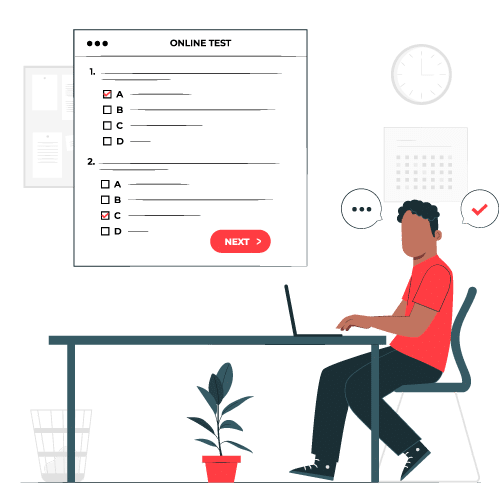The landscape of recruiting Title Examiners has witnessed notable trends and shifts in recent years. As the real estate industry continues to grow, the demand for skilled professionals in title examination has seen a corresponding increase. HR professionals and CXOs are recognizing the critical role that Title Examiners play in ensuring the accuracy and legality of property titles, making it essential to attract and retain top talent in this field.
According to industry data, the employment of Title Examiners is projected to grow steadily in the coming years, reflecting the ongoing demand for their expertise. This dynamic landscape necessitates a strategic approach to recruitment, focusing on identifying candidates with a strong understanding of title examination processes, excellent research skills, attention to detail, and a comprehensive knowledge of real estate laws and regulations. By leveraging targeted recruitment strategies and asking insightful interview questions, organizations can secure qualified Title Examiners who contribute to the smooth and efficient transfer of property titles, ultimately driving success in the real estate sector.
Here are the top 60 Title Examiner interview questions to ask job applicants:
15 general interview questions for the Title Examiner
- Can you explain the role of a Title Examiner and its importance in the real estate industry?
- What steps do you follow when examining a property title for accuracy and potential issues?
- How do you research and verify property ownership records and legal documents?
- Can you discuss any challenges or complexities you have encountered while examining property titles? How did you handle them?
- How do you ensure compliance with relevant laws, regulations, and guidelines when examining titles?
- Can you provide an example of a title defect or issue you identified and how you resolved it?
- What software or tools do you use for conducting title searches and managing title examination processes?
- How do you prioritize your workload and manage multiple title examinations simultaneously?
- Can you describe your process for preparing detailed reports or summaries of title examination findings?
- How do you stay updated on changes in real estate laws and regulations that may impact title examinations?
- What qualities or skills do you think are essential for a successful Title Examiner?
- How do you handle confidential and sensitive information when working with property titles?
- Can you discuss your experience collaborating with other professionals, such as attorneys, lenders, or real estate agents, during the title examination process?
- How do you ensure accuracy and attention to detail when reviewing complex legal documents and property records?
- Can you share any strategies you use to maintain efficiency and productivity in your role as a Title Examiner?
5 sample answers to general interview questions for the Title Examiner
- Tell me about your experience as a Title Examiner.
Look for: In this question, you want to assess the candidate’s relevant experience as a Title Examiner. Look for their understanding of title examination procedures, familiarity with title documents, and their ability to handle complex title issues.
Example answer: “In my previous role as a Title Examiner at XYZ Title Company, I gained extensive experience in examining property titles. I conducted thorough research and analysis of title records, ensuring accuracy and identifying any potential issues. I was responsible for reviewing legal documents, such as deeds, mortgages, and liens, to determine the chain of ownership and uncover any encumbrances. I also collaborated with attorneys and real estate professionals to resolve complex title issues, ensuring a smooth transfer of property ownership.”
- How do you stay up-to-date with changes in title laws and regulations?
Look for: This question aims to evaluate the candidate’s commitment to staying informed about industry changes. Look for their proactive approach in keeping up with evolving laws and regulations, such as attending seminars, participating in professional associations, or staying updated through online resources.
Example answer: “I understand the importance of staying current with changes in title laws and regulations. I actively engage in professional development opportunities, such as attending industry seminars and workshops. Additionally, I am a member of the National Association of Title Examiners, which provides access to the latest updates and best practices in our field. I also subscribe to industry newsletters and participate in online forums to stay informed about any regulatory changes that may impact my work as a Title Examiner.”
- How do you handle complex title issues or discrepancies?
Look for: This question aims to assess the candidate’s problem-solving skills and ability to navigate complex title issues. Look for their analytical thinking, attention to detail, and their approach to resolving discrepancies.
Example answer: “When faced with complex title issues or discrepancies, I adopt a systematic approach. I carefully review all relevant documents, comparing different records and identifying any inconsistencies. I then conduct thorough research to gather additional information and collaborate with colleagues, attorneys, or other professionals to gain further insights. I leverage my attention to detail and analytical skills to trace the chain of ownership and uncover the root cause of the discrepancy. Once I have a clear understanding of the issue, I work diligently to find appropriate solutions, whether it involves correcting errors, obtaining necessary documentation, or consulting legal experts when needed.”
- How do you ensure accuracy in your title examinations?
Look for: This question aims to gauge the candidate’s commitment to accuracy and attention to detail. Look for their quality control processes, methodologies to minimize errors, and their approach to double-checking their work.
Example answer: “Ensuring accuracy in title examinations is a top priority for me. To achieve this, I follow a rigorous quality control process. I meticulously review all documents, cross-referencing them to ensure consistency and completeness. I pay close attention to detail, double-checking my work at every step. I also leverage technology tools and software to aid in the verification process, reducing the chances of errors or oversights. Additionally, I maintain open communication with colleagues and seek feedback to continually improve my accuracy and efficiency.”
- How do you handle a high volume of title examinations within tight deadlines?
Look for: This question assesses the candidate’s ability to manage time effectively and work efficiently under pressure. Look for their organizational skills, ability to prioritize tasks, and strategies they use to meet deadlines without compromising quality.
Example answer: “Handling a high volume of title examinations within tight deadlines requires effective time management and organization. To ensure efficiency, I create a prioritized schedule, identifying key tasks and allocating appropriate time to each. I leverage technology tools, such as document management systems, to streamline the process and minimize manual errors. Additionally, I maintain open communication with team members, coordinating workload distribution when necessary. I understand the importance of balancing speed and accuracy, and I strive to meet deadlines without compromising the quality of my work.”
15 behavioral interview questions for a Title Examiner
- Tell me about a time when you encountered a complex title issue. How did you approach it, and what steps did you take to resolve it?
- Can you describe a situation where you had to handle multiple title examinations simultaneously? How did you prioritize your workload and ensure timely completion?
- Share an example of a time when you discovered an error or discrepancy in a title document. How did you handle it, and what was the outcome?
- Describe a challenging situation where you had to collaborate with real estate professionals or attorneys to resolve a title-related problem. How did you ensure effective communication and cooperation?
- Can you share a situation where you needed to conduct extensive research to gather additional information for a title examination? How did you go about it, and what were the results?
- Tell me about a time when you had to meet a tight deadline for a title examination. How did you manage your time and resources to complete it on schedule?
- Share an example of a time when you discovered a hidden lien or encumbrance during a title search. How did you handle the situation, and what actions did you take to address it?
- Describe a situation where you had to deliver unwelcome news or communicate a challenging title issue to a client or stakeholder. How did you approach the conversation, and how did you ensure their understanding and satisfaction?
- Can you provide an example of a time when you identified an opportunity to streamline title examination processes or improve efficiency? What steps did you take, and what were the outcomes?
- Tell me about a time when you faced resistance or pushback from a colleague or team member regarding a title examination approach. How did you handle the situation and ensure alignment?
- Describe a time when you needed to work with limited or incomplete information during a title examination. How did you mitigate the risks and make informed decisions?
- Share an example of a situation where you had to handle confidential or sensitive information during a title examination. How did you ensure data privacy and security?
- Tell me about a time when you had to adapt your title examination process or approach to comply with new regulations or industry standards. How did you stay updated, and how did you implement the necessary changes?
- Describe a situation where you had to handle a high-stress title examination request or urgent client request. How did you manage the pressure, and what strategies did you use to ensure accuracy and quality?
- Share an example of a time when you identified a potentially fraudulent activity or misrepresentation during a title examination. How did you handle the situation, and what actions did you take to protect your organization and clients?
5 sample answers to behavioral interview questions for the Title Examiner
- Tell me about a time when you encountered a complex title issue. How did you approach it, and what steps did you take to resolve it?”
Look for: In this question, look for the candidate’s ability to handle complex title issues by demonstrating analytical thinking, problem-solving skills, and the steps they took to resolve the problem.
Example answer: “In a previous role, I encountered a complex title issue where there was a discrepancy in the chain of ownership due to an incomplete or improperly recorded deed. To address the issue, I first conducted a thorough review of the title documents and related records. I identified the missing information and reached out to the appropriate parties, including the property owner, real estate agents, and attorneys involved in the transaction. Through collaboration and extensive research, I was able to locate the necessary documentation and gather affidavits from relevant parties to rectify the title issue. By ensuring all necessary information was recorded accurately, I successfully resolved the complex title issue.”
- Describe a situation where you had to handle multiple title examinations simultaneously. How did you prioritize your workload and ensure timely completion?
Look for: This question assesses the candidate’s ability to manage multiple tasks and prioritize their workload effectively to meet deadlines.
Example answer: “In a previous position, I was responsible for handling a high volume of title examinations simultaneously. To prioritize my workload, I first assessed the urgency and complexity of each examination. I created a detailed schedule, outlining deadlines for each task based on their importance and client requirements. I leveraged organizational tools, such as project management software, to track progress and ensure timely completion. Additionally, I maintained open communication with clients, providing regular updates on the status of their examinations. By effectively managing my time, staying organized, and communicating with stakeholders, I was able to successfully complete all the title examinations within the specified timeframes.”
- Share an example of a time when you discovered an error or discrepancy in a title document. How did you handle it, and what was the outcome?
Look for: This question evaluates the candidate’s attention to detail, ability to spot errors, and their approach to rectifying mistakes.
Example answer: “During a title examination, I discovered a significant error in a recorded mortgage document. The document incorrectly listed the property address, potentially leading to future complications and clouding the title. To address the issue, I immediately documented the error and gathered supporting evidence, such as the correct property address from other records. I promptly contacted the lender and provided them with the correct information, requesting an amendment to the mortgage document. Through clear and concise communication and by providing the necessary evidence, we were able to rectify the error, ensuring the accuracy of the title record.”
- Describe a challenging situation where you had to collaborate with real estate professionals or attorneys to resolve a title-related problem. How did you ensure effective communication and cooperation?
Look for: This question assesses the candidate’s ability to collaborate with stakeholders, communicate effectively, and work towards a resolution.
Example answer: “In a recent project, I encountered a complex title issue that required collaboration with both real estate professionals and attorneys. To ensure effective communication and cooperation, I scheduled regular meetings and conference calls with all parties involved. I created a shared document where we could collectively track progress, exchange information, and address any concerns. I also made sure to actively listen to their perspectives, value their input and provide timely updates on the status of the title examination. By fostering open and transparent communication, we were able to work together towards a resolution, ultimately resolving the title-related problem.”
- Tell me about a time when you had to meet a tight deadline for a title examination. How did you manage your time and resources to complete it on schedule?
Look for: This question evaluates the candidate’s ability to work efficiently under pressure, manage their time effectively, and allocate resources appropriately.
Example answer: “In a previous position, I encountered a situation where I had to complete a title examination within a tight deadline due to a client’s urgent request. To manage my time effectively, I first analyzed the scope of the examination and broke it down into smaller, manageable tasks. I created a detailed timeline, identifying milestones and allocating specific time slots for each task. I also leveraged technology tools, such as automation software, to streamline repetitive tasks and minimize errors. Additionally, I communicated the urgency of the request to my team and requested their support when necessary. By implementing these strategies and maintaining focus, I successfully completed the title examination within the specified deadline without compromising the quality of my work.”
15 personality interview questions for the Title Examiner
- How do you handle situations when you encounter conflicting information or ambiguous title documentation?
- Describe a time when you had to adapt to changes in title examination procedures or policies. How did you handle the transition?
- Can you explain how you maintain attention to detail while working on repetitive tasks in the title examination?
- How do you manage your workload and stay organized when dealing with multiple deadlines and priorities?
- Describe a situation where you had to deal with a difficult or upset client during a title examination. How did you handle the interaction?
- What steps do you take to ensure confidentiality and data security when handling sensitive title information?
- How do you approach building and maintaining professional relationships with real estate professionals, attorneys, and other stakeholders involved in the title examination process?
- Describe a time when you needed to make a judgment call or decision based on limited information during a title examination. How did you handle it?
- How do you handle high-pressure situations or tight deadlines without compromising the accuracy and quality of your work?
- Can you explain your approach to continuous learning and professional development as a Title Examiner?
- Describe a situation where you had to work independently or take the initiative to complete a title examination successfully.
- How do you manage your time and resources when faced with unexpected interruptions or changes in priorities during a title examination?
- Describe a time when you had to provide complex title information or explanations to individuals with limited knowledge of the subject matter. How did you ensure their understanding?
- How do you handle situations when you come across a title examination issue or problem that you have not encountered before?
- Can you describe a situation where you had to collaborate with a diverse team or work with individuals from different backgrounds or perspectives during a title examination? How did you contribute to a positive and inclusive working environment?
5 sample answers to personality interview questions for Title Examiner
- How do you handle situations when you encounter conflicting information or ambiguous title documentation?
Look for: This question assesses the candidate’s ability to handle ambiguity, critical thinking skills, and approach to resolving conflicting information.
Example answer: “When faced with conflicting information or ambiguous title documentation, I take a systematic approach to ensure accuracy. I start by thoroughly reviewing all available documents and records, and comparing the information presented. If discrepancies arise, I conduct additional research and reach out to relevant parties, such as county clerks or attorneys, to clarify the inconsistencies. I strive to obtain as much clarity as possible to make informed decisions. In situations where complete resolution is not immediately achievable, I document the inconsistencies and present all available information to stakeholders for their consideration. By maintaining transparency and taking an analytical approach, I work towards minimizing the impact of conflicting information on the title examination process.”
- Describe a time when you had to adapt to changes in title examination procedures or policies. How did you handle the transition?
Look for: This question evaluates the candidate’s adaptability, flexibility, and their ability to embrace change.
Example answer: “In my previous role, there was a significant update to the title examination software we were using, requiring a shift in procedures and policies. To adapt to the changes, I attended training sessions provided by the company and actively sought resources to familiarize myself with the updated software and procedures. I maintained an open mindset, recognizing the benefits that the changes could bring to the efficiency and accuracy of our work. I collaborated with colleagues to exchange knowledge and best practices, leveraging their expertise during the transition. I proactively sought feedback from supervisors and continuously evaluated my performance to ensure I was aligning with the new processes. Ultimately, I embraced the changes and successfully integrated the updated procedures into my daily workflow.”
- How do you manage your workload and stay organized when dealing with multiple deadlines and priorities?
Look for: This question assesses the candidate’s organizational skills, time management abilities, and approach to handling competing priorities.
Example answer: “To manage my workload and stay organized, I prioritize tasks based on deadlines and importance. I create a detailed schedule or to-do list, breaking down larger projects into smaller, actionable steps. I leverage digital tools such as project management software or spreadsheets to track progress and deadlines. I also communicate with stakeholders, such as clients or team members, to align expectations and manage timelines. Additionally, I regularly assess my progress and make adjustments as needed to ensure timely completion. By staying organized and proactive in my approach, I am able to effectively handle multiple deadlines and priorities without compromising the quality of my work.”
- Describe a situation where you had to deal with a difficult or upset client during a title examination. How did you handle the interaction?
Look for: This question evaluates the candidate’s interpersonal skills, customer service orientation, and ability to handle challenging client interactions.
Example answer: “In a previous role, I encountered a situation where a client became upset due to delays in the title examination process. I approached the interaction with empathy and active listening. I allowed the client to express their concerns and frustrations, ensuring they felt heard and understood. I apologized for the inconvenience caused and provided a transparent explanation of the reasons for the delay. I then presented a plan to expedite the examination process and provided regular updates to the client, assuring them of our commitment to resolving the issue promptly. By maintaining open and respectful communication, I was able to alleviate the client’s concerns and restore their confidence in our services.”
- Can you explain your approach to continuous learning and professional development as a Title Examiner?
Look for: This question assesses the candidate’s commitment to growth, willingness to learn, and their approach to staying updated in the field of title examination.
Example answer: “As a Title Examiner, I understand the importance of continuous learning and professional development to stay up-to-date with industry trends, regulations, and best practices. I actively seek out educational opportunities such as industry conferences, webinars, and workshops. I also engage in independent research and subscribe to industry publications to stay informed about emerging issues and advancements in the field. Additionally, I participate in internal training programs offered by my employer to enhance my skills and knowledge. I believe in the value of networking with other professionals in the field and am an active member of professional organizations related to title examination. By embracing a growth mindset and actively pursuing learning opportunities, I strive to provide the highest quality of service as a Title Examiner.”
When should you use skill assessments in your hiring process for Title Examiner?
Skill assessments should be used in the hiring process for Title Examiners to ensure candidates possess the necessary skills and abilities to perform the job effectively. Assessments are important because they provide an objective and standardized way to evaluate candidates’ skill levels, helping to validate their claims and qualifications stated in their resumes or interviews. By incorporating skill assessments, employers can make informed decisions based on evidence of a candidate’s abilities, reducing the risk of hiring individuals who may not possess the required skills for the role.
There are several assessments that can be used to evaluate the skills of Title Examiners. One common assessment is a written examination that assesses candidates’ knowledge of title examination procedures, legal principles, and relevant regulations. This type of assessment can help gauge candidates’ understanding of the industry and their ability to apply their knowledge to practical scenarios.
Another assessment option is a practical exercise or simulation where candidates are presented with sample title documents and asked to identify potential issues, discrepancies, or missing information. This assessment helps evaluate their attention to detail, analytical skills, and ability to interpret complex title documents accurately.
Additionally, technology-based assessments can be utilized to evaluate candidates’ proficiency in using title examination software and tools commonly used in the industry. These assessments measure candidates’ technical skills and their ability to navigate and utilize software effectively.
Overall, incorporating skill assessments in the hiring process for Title Examiners ensures that candidates possess the required skills and knowledge for the role, leading to more successful and efficient hiring decisions.
Use our interview questions and skill tests to hire a talented Title Examiner
Unlock the potential of your hiring process with Testlify’s comprehensive skill assessments and interview questions specifically designed for Title Examiner.
Our extensive test library offers a wide range of assessments, including cognitive function, personality, situational judgment, programming, and more. By leveraging these assessments, you can objectively evaluate candidates’ abilities, ensuring you shortlist the most talented individuals efficiently.
To further enhance your hiring process, we invite you to book a free 30-minute live demo. Our expert team will guide you through the platform, showcasing relevant skill tests tailored to your hiring needs. With our support, you can streamline candidate selection, saving valuable time and resources.
Ready to find the perfect fit for your Title Examiner role? Testlify provides the tools you need to make informed hiring decisions. Explore our skill assessments and interview questions today to uncover exceptional talent for your team.








